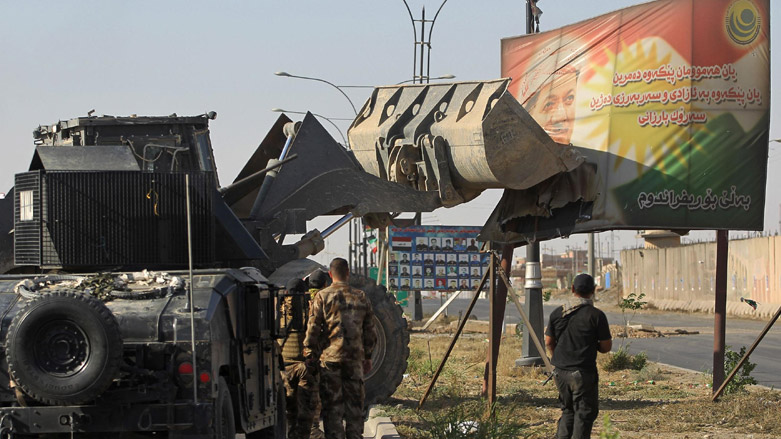Nearly 50 Kurdish officials ousted in Iraq's disputed territories since October

ERBIL (Kurdistan 24) – Ethnic Kurds holding at least 48 influential posts in Iraq's disputed territories have been replaced by those from Arab and Turkmen parties since Iraqi troops and Iranian-backed militias pushed Kurdish Peshmerga forces from the areas in late 2017.
The military operation came on Oct. 16 in response to the Kurdistan Region's independence referendum, held in September throughout the region and in areas disputed by Baghdad and Erbil. Kurdish lawmakers from Kirkuk, the most prominent of the disputed territories, have previously told Kurdistan 24 that, ever since, the province has witnessed a campaign of “forceful demographic change” that aims to weaken the Kurds.
Though discord between members of different ethnic groups is an obvious factor, it should be noted that rivalries between parties which fall along ethnic lines make the issue in large part one of local and national political dominance as well.
According to information collected by Kurdistan 24, the number of formerly Kurdish-held posts now occupied by others varies from one district to another, but shows a clear trend. The posts mentioned in this report do not include many low-level public employees and military officers who have been removed.
In Kirkuk, Kurds lost 20 posts: Governor, Mayor of the city of Kirkuk, head of Kirkuk's Provincial Council, Head of the Integrity Commission, Director of Security Companies, and heads of the Health, Agriculture, Housing, Food, Investment, Water Resources, Youth Sport Activities, Roads, Kirkuk Suburban Police, Crime-prevention, Emergency Police, Drug-prevention, and Archeology Protection Police Directorates.
In Kirkuk Province’s town of Daquq, Kurds lost seven posts: Mayor and heads of the Police, Crime-Prevention, Agriculture, Natural Resources, Communication, and Finance Directorates.
The former Iraqi government of Saddam Hussein implemented a campaign of "Arabization" in Kirkuk Province and other Kurdish-populated areas in Nineveh, Salahuddin, and Diyala, meant to change the demography of the areas by forcibly displacing Kurdish residents and replacing them mostly with Arabs from central and southern Iraq.
“Seven months after the Oct. 16 attack, the acting Governor of Kirkuk decided to remove me," former Daquq Mayor Amir Khwakaram told Kurdistan 24 on Friday. "We completely reject this decision. It is another systematic Arabization campaign in the area against the Kurds.”
“I will not give up on this post even if they threaten to cut my head from the body because this is another Arabization campaign in the area, and I will appeal against this decision in the Federal [Supreme] Court of Iraq. We will not stand silent regarding this case.”
Also in Kirkuk Province, in the towns of Dibis, Sargarran, and Altun Kupri (Pirde), Kurds lost eight influential posts in recent months: Mayor and heads of the Crime-prevention, Agriculture, Notaries, Police, Citizenship and Residence, and Electricity Distribution Directorates.
In the town of Khurmatu (Tuz Khurmatu), six posts held by Kurds were replaced by Arabs and Turkmen: Mayor and heads of the Agriculture, Electricity, Municipality, Health, and Veterinary Directorates.
In Nineveh Plains and Sinjar (Shingal), Kurds lost seven posts: Mayors of Shingal, Snune, Gir Ozeir and heads of the Mosul Water Resources Directorate, Zumar Police, and Police and Citizenship in Tiklef’s Wane District. Over 200 policemen and other government employees were also sacked in Zumar.
According to the constitution of Iraq, the disputed territories must be jointly administered by the Kurdistan Regional Government (KRG) and the federal government of Iraq until their permanent status is determined by provisions in the oft-quoted Article 140 that has awaited implementation for over a decade.
Kurdish officials claim their mass ouster shows no intention on the part of the federal government to govern jointly, but rather one to push them out.
“There is a negative attempt from Baghdad to fire Kurdish directors in Kirkuk and more things will be followed. This is unacceptable, and we as Kurds should have a voice and be in line on this case,” Bestun Zangana, a former member of the Iraqi parliament, told Kurdistan 24 on Friday.
“There is so much threatening against the Kurds in Kirkuk,” he said, stating that, based on known demographics, Kurds make up more than half of the population in the province. Any changes, he asserted, should be based on election results and not carried out unilaterally by any party.
Since Iraqi forces took responsibility for protecting Kirkuk and other disputed territories in October, the security situation has deteriorated there substantially, with remnants of the Islamic State (IS) regrouping to carry out various attacks including explosions, kidnappings, ambushes, and suicide bombings.
Editing by John J. Catherine
(Additional reporting by Hemin Dalo and Soran Kamaran)
